I need to say at the onset that there is a reason why I have not talked about them, and it is that most of them simply don’t live up to their claims. Despite that, there are various aspects of this major Japanese skincare “phenomenon” that I would like to present, so this will be an extended post.
First of all, just to be clear, whitening products sold in Japan and some other Asian countries are not skin-bleaching products, the sales of which are illegal in many countries around the world. If the mechanisms of whitening products do work, what they do is to bring the coloration of the skin back to the tan-less state.
Most major Japanese cosmetics brands have a fully-fledged whitening line, with products from cleansers to foundations. The most established brands even have several different whitening lines. For example, Shiseido has UVWhite, White Lucent, and the recently very successful Haku (seen above).
Many major western cosmetics lines also have Asia-exclusive whitening lines:
(image from www.lancome.jp)
With this concept as the basis, many Japanese and western cosmetics brands have a full whitening skincare and base makeup range. Typical items include:
Makeup remover & face wash: They are designed to deep cleanse the skin and get rid of dead skin cells.
Toner: It often has exfoliating agents like fruit acids and more than a fair amount of alcohol to help strip off the dead skin cells.
Serum: It is usually billed as the key item of a whitening line and is supposed to have the highest concentration of melanin inhibitors and, in some cases, exfoliating agents. Counter assistants usually recommend the serum if one wants to venture into whitening skincare products but doesn’t want to invest in the whole line.
Mask: More melanin inhibitors and exfoliating agents.
Nighttime moisturizer: More melanin inhibitors and exfoliating agents.
Daytime moisturizer: It usually has a high SPF (around 30 or more) and PA level. (PA indicates the level of UVA protection, ranging from PA+ to PA++++.) It usually also incorporates micro light-reflective particles to give an illusion of brightness and luminosity.
Concealers/ foundations: Again, high SPF and PA as well as a lot of light-reflective particles.
A more elaborate whitening line usually includes items like:
Wipe-off lotion: It is used right after cleansing (and before toning) to further strip the dead skin cells off the skin. It is used on a cotton pad and applied in a wiping (not patting) motion.
Massage cream: Used right after cleansing (and after the wipe-off lotion), it attempts to boost blood circulation and to combat dullness in order to achieve a brighter complexion.
Eye cream: It is specifically for the eye area and is not necessarily targeted at getting rid of dark circles.
So, do they actually work?
In most cases, quite unlikely. The reason why they don’t usually work is very similar to why self-proclaimed anti-aging skincare products don’t usually work. Whitening products exist mainly because customers want to be told that they can achieve what they want to achieve. This is exactly how anti-aging products market themselves. (Almost coincidentally, wearing a sunscreen happens to be the simple answer to both anti-aging and whitening…)
Also, in Japanese cosmetics, whitening products are by far the most frequently revamped products. (A complete new line or new additions to an existing line are usually brought out at this time of year because the weather is about to get warmer and sunnier and people start to get more concerned about sun exposure.) With most brands, the whitening range gets revamped (to various extents) every year or every other year. Most companies want customers to believe that the whitening technology is improving, but, in almost all cases, products are not delivering the goods, so new ones need to be brought out, with new pseudo-scientific claims and new glowing results from non-independent research.
Plus, I rarely hear people missing a certain whitening product when it is discontinued and replaced by a new version. That alone is quite telling.
On a personal level, for a couple of years quite some time ago (when I was avidly experimenting with all kinds of skincare products), some of the whitening products that I tried are the harshest skincare products that I have ever used. Many Japanese toners and moisturizers already have a lot of alcohol (which simply should be avoided in any skincare product), and whitening toners and moisturizers sometimes have even more. (Despite its popularity, Kosé’s Sekkisei is perhaps one of the most skin-irritating products I have ever tried, as it is heavily loaded with alcohol.) Judging by the ingredient lists of many current whitening products, it seems that nothing has changed.
(To be fair, I am sure there are a few whitening products that are a little more gentle. Out of the several that I bought during that time, only the whitening serum by Sofina was something I remotely liked. It was free from alcohol and exfoliating agents. What it achieved was simply a more even complexion, but so can any well-formulated moisturizer.)
On a related note, every year, the names of a brand’s whitening line and individual whitening products incorporate such blatantly suggestive terms, so much so that I find them almost amusing.
Helena Rubinstein: Premium White (2006), Divine White (2007), Age White (2008)
Guerlain: Perfect White
Givenchy: Doctor White
Estee Lauder: Cyber White
Lancôme: Blanc Expert NeuroWhite
Clinique: Active White (2005), Derma White (current)
Cosme Decorte: Whitelogist
Pola: White Shot Melano Shooter
SKII: Whitening Source Derm-Revival
Dior: DiorSnow Sublissime
Origins: Light Years Ahead
Currently, the Kanebo website is building up to the grand launch of their latest whitening serum. The name:
Whitening Conclusion
I can’t help but wonder what they will name their new whitening product in 2009. I am extremely curious…
(On a minor note, as you might have observed, a lot of ads for whitening products feature blue as the predominant accent color. In Japanese culture, blue denotes purity, lucidity, and transparency and goes well with the idea of whitening products.)
However, there is still a lesson to be learned from this whole whitening phenomenon in Japan, which doesn’t involve whitening products themselves. Because many Japanese people strive to have a milky and porcelain-white complexion, they tend to be very diligent and almost religious about applying sunscreens.
So, even though their long and winding road to a perfect/premium/divine/active/cyber white complexion might be never-ending, at least they are keeping their skin optimally protected against the harmful and aging UV rays and maintaining a healthy and youthful appearance of their skin.
Related Posts:
A Touch of Blusher‘s Anti-Aging Series
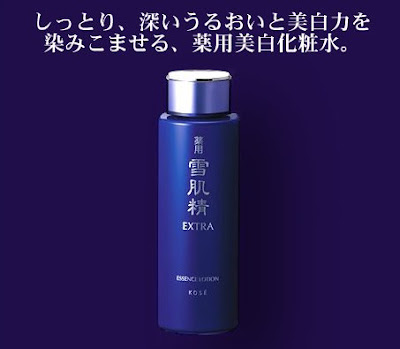
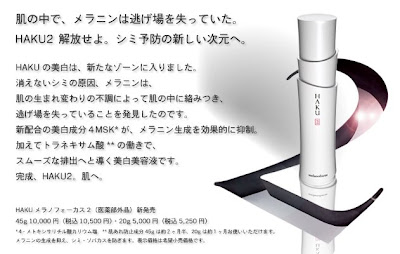
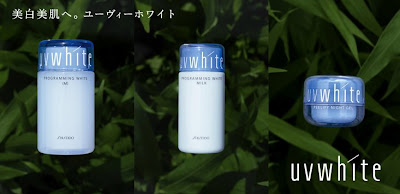
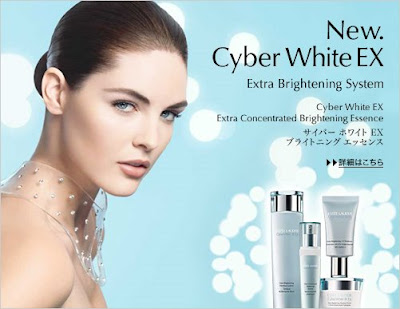
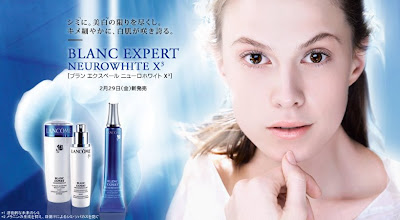
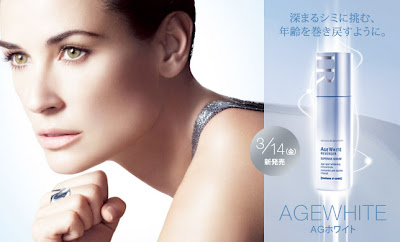
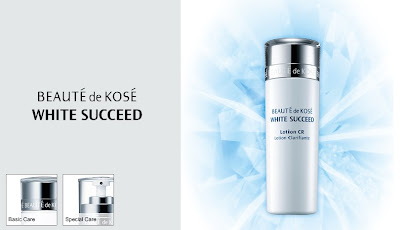

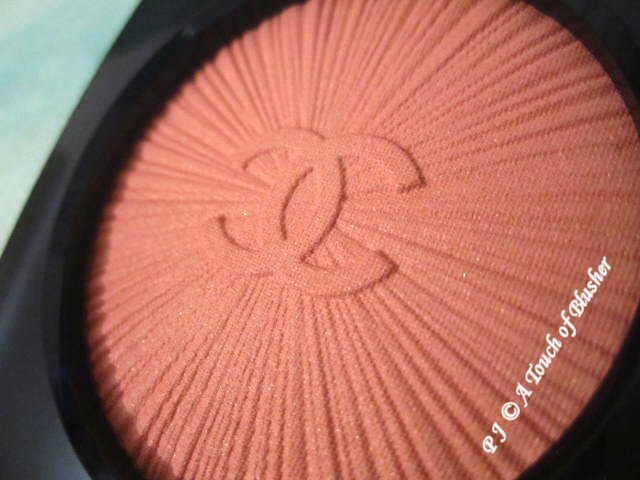


{ 22 comments… read them below or add one }
When I go to China, I’m always amused by the endless ads for whitening products — manufactured by the same conglomerates that bombard American consumers with ads for tanning products!
Hi PJ,
long time no comment :) just wondering, and I’m hope i’m not prying but are you by any chance asian (i mean oriental descent)? i’m just curious, you don’t have to say if preferred not to.
Whitening products don’t whiten the skin… they don’t change naturally olive tanned skin to white porcelain skin. What they do is slowly smoothen out the outer layer’s skintone, lighten freckles.
10minutes in the sun could end up with u using half the bottle before u see any results, thats y they dish out dallops of $$ to invent decent sunscreens… They do work, just really slow.
Estee Lauder’s Cyberwhite works creepily fast. u can see results in a week. u kind of wonder how strong the chemicals in there are.
Hi Anna,
That’s indeed a good point.
I guess what cosmetics companies do, just like all businesses, is to cater to as well as create demands of the customers…
Thank you for visiting my blog and sharing your thoughts! :)
Hi Nic Nic,
Good to hear from you again.
As you have probably noticed, I don’t usually talk about my personal life on my blog, but, yes, I am of East-Asian descent.
Thank you for stopping by again!
Hi EJ,
You are right that whitening products don’t bleach the skin and, at best, they bring the skin-tone back to what people are born with, which I mentioned on my post.
My view is that many whitening products contain harsh ingredients to strip the outer layer of the skin. This alone makes whitening products less-than-ideal for most people. Even if some of the products do lighten the skin-tone, people are doing this at the expense of the health of their skin. It is simply not worth it.
Also, in terms of the issue of alcohol, which is so prevalent in whitening skincare products, many people enjoy the seemingly refreshing and tingling sensation of using a toner or a moisturizer that contains alcohol without knowing that they are potentially damaging their skin. (Bear in mind that skin irritation is not always immediately visible and can later become so after long-term exposure to skin irritants.)
On a related note, if a product works creepily fast, it is more worrying than anything else. The ingredients are often about getting the visible results that people are desperate to see rather than about actually taking care of the skin.
Thank you for visiting my blog and leaving your comment! :)
Hey dear!
As usual, a nice long and detailed post! =D Love the kind of effort u put in to make things as clear as possible for us readers.
Anyways, I just wanna share my opinion on some of the whitening stuff I am/was using. Most of them totally do not work at all!
Clinique’s Derma White line does nothing for my mum, who has dark spots on her face. She was told that the whole bottle must be finished to see results and when she finished it, the skin consultant at the counter said maybe for my mum, 2 bottles are needed. So she tried again and nothing worked… the lotion doesn’t work, spot whitening serum doesn’t work either! Must have cost my mum about $500 and it didn’t show a single bit of result!
I personally tried the Lancome’s spot corrector and it did nothing for me either. It was suppose to erase pigmentation, including ance scars and I totally do not see a single bit of effect AT ALL.
I’ll be getting the Givenchy one next week because I like the packaging… =D I know how stupid that sounds but oh well. Maybe I’ll just get one item from that line and I’ll tell u how good/bad it is later!
Anyways, one line which actually worked and it’s SKII! I forgot the exact name of the line because my mum used it quite a few years ago and she was telling me how it reduced the dark spots so well. However she stopped using it because it was a little oily for her especially since Singapore is such a humid tropical country. It may be great for the others living in cooler climates though.
Thanks for ur effort! =D Love!
Hi Cosine,
Thank you so much for sharing your thoughts (and your mother’s)! :)
As you see in the post, I haven’t been using whitening products for years. It is simply not a genre of skincare products that I am interested in anymore. But it is always illuminating to hear about thoughts and views on these products.
Several years ago, one of my friends was planning to get whitening products from SKII but asked me for more recommendations regarding other brands, and I actually talked her out of buying whitening skincare products altogether. I told her to wear sufficient sunscreen every single day, exercise regularly, make sure to get enough sleep every day, and see what would happen in three months.
The tan faded eventually over months, and her skin looked radiant and healthy (it still does). She has never wanted to buy any whitening product since…
Recently, there are more and more “brightening products” in the west as well. They don’t claim to brighten the complexion. Most of their claims are about improving the appearance of dark spots and hyper-pigmentation. I’d think the mechanisms at work are similar. At the moment, many of them are marketed as anti-aging products. It will be intriguing to see how well these products can attract customers here in the UK…
Thank you again for sharing your experiences! :)
This was a very informative post! I tend to use whitening products but not for the actual whitening results. In Canada a couple companies sell their whitening products along with their regular stock. Dior for example with their DiorSnow line. I use the foaming cleanser out of that line because of all the cleansers I’ve used, that one does its job rather well. I usually read the ingredients for the cosmetics I use but after this post, I checked the ingredients for it and couldn’t find one as alcohol, unless they’re using a different name that’s lesser known. I was rather concern because from how I read this post, it sounds like the whitening products strip the skin dry, which would explain why my skin feels so clean though there’s no stinging sensation like with Clean & Clear’s deep cleanser.
The only other product I use is a skin luminzer of the same line for costume purposes when I need my skin to be pale but it’s more of a lavender foundation rather than a cream that penetrates the skin.
Hi Ebontien,
I wouldn’t usually suspect a cleanser to have alcohol. (But some I’ve seen still do.) I think most of the alcohol in whitening lines is in the toners and the moisturizers.
If you are concerned, the types of alcohols that can pose as skin irritants are ethanol, denatured (denat.) alcohol, ethyl alcohol, methanol, benzyl alcohol, isopropyl alcohol, and sd alcohol (from Paula Begoun’s Cosmetic Ingredient Dictionary, under “alcohol”).
Indeed, the mechanisms in which some whitening products work can potentially dry the skin. While some people (who live in a warm climate and who don’t have issues of dry skin) might be able to put up with using a whole line of whitening products which are potentially drying, most people have to be quite careful about bring whitening items into the skincare routine.
It sounds that the DiorSnow cleanser is simply more of a deep-cleansing item. As a cleanser is definitely not able to have any whitening effect, the cleanser in a whitening range is usually designed to deep cleanse and get rid of dead skin cells. So, if this is something your skin regularly needs, then do continue to use it but do make sure your skin is optimally moisturized afterwards.
The luminizer you use also sounds absolutely fine, since the whitening effect is mainly cosmetic.
Thank you very much for leaving your informative comment again! :)
hello again,
I thought there are exceptional alcohol types you may see in products that are safe to use.
I wish I was more diligent and more educated about using sunscreen before and my mom knew the importance of it which I don’t even remember her and my guardians putting spf lotion on us when we were small except when going to the beach -_-; and even now my mom doesn’t use a sunscreen lotion on my younger siblings (which I will tell her the importance of it when I see her). She pays tons of money for her skin though *going to a clinic* so she doesn’t really use whitening products.
But in my case, I can think back on all the excessive time of unprotected exposure to the sun which makes me regret now, though I don’t have very dark spots I still have them & trying to get rid of them is way harder then trying to prevent/slow down from the start. To have a nice clear complexion which everyone would wish. And I hate wearing foundations/concealer. I am hoping there is a product out there or soon to be created that’ll give us the result of a whitening product. >_<
Hi there,
Dark spots and hyper-pigmentation due to sun exposure are genuine concerns for many people, and I totally understand where you are coming from.
Most of the time, they are not easy to treat with skincare products. The amount of active ingredients in skincare products is generally regulated. Otherwise they will be classified as medicine.
I can understand why some people opt for expensive clinical procedures to improve the appearance of their skin. As they tend to be more intrusive than using skincare products, you need to make sure your skin can tolerate them.
There are other ingredients with the word “alcohol” that pose no threat to the skin. These are what is called fatty alcohols or fatty acids, and they are emollients. In skincare products, commonly used fatty acids include stearyl alcohol and cetearyl alcohol. You will probably see one or both of them in a lot of moisturizers, and you don’t need to worry about them.
Hope it helps! :)
Thank you for posting your thoughts! :)
Dear PJ,
I am really, really grateful to you for maintaining this blog, which provides detailed information about the Japanese cosmetics (skincare and make up). I have been buying Japanese skincare for quite a while and now I am planning to try make up as well.
You are right noting that so-marketed whitening products per se do not whiten skin. They are more geared to impart an even skin tone by diminishing the look of freckles or other spots and inhibiting melanin production. Upon purchasing Lightening Cream by NARS, I have learnt that (1) whitening creams tend to make skin drier; and (2) sun block is a must for having this pearly white skin tone.
Thus, I look for whitening products that would better maintain my evened out skin tone. Well, it is cultural, I believe. I would be most kind of you to bring out an opinion on Albion’s Exage White and Kanebo’s Impress IC. What line is better?
Thanks in advance.
Best regards,
Arubiina
Dear Arubiina,
Thank you very much for posting your comment again. I hope you are well.
You are absolutely right about what whitening products can (and can’t) do, and, indeed, using a sunscreen is simply a must, not only for maintaining an even skin tone but also for the well-being of the skin.
I have to say that, because I have not been using whitening products for a long time, it is difficult for me to judge whether Albion Exage White or Kanebo Impress IC is better. But these two lines are probably two of the most popular ranges at the moment. Exage White seems to have an avid following and Impress IC is more of a popular newcomer (which I believe is slightly less expensive). Also, I am sure you know that Shiseido’s Haku is very popular too.
If you are able to view the full ingredient lists on the product boxes, I would suggest trying items that have less alcohol (especially since you might have issues with dryness). (I believe most Exage toners and moisturizers have alcohol, and I doubt if those from Impress IC are alcohol-free.
Hopefully you will find products that work for you, and do let me know your thoughts on what you choose to test out.
Thank you very much again for your comment! :)
PJ
Hi PJ,
I think it really depends on the person whether or not the whitening product does work. I was born very very dark-skinned, but after my first set of Shiseido UV White, it was clear that I had become a lot lighter. My mom still hangs pictures of me from when I was a child (ages 3-15) around the house and people are always asking her who that girl is and they are always surprised to hear that its me because my skin colour has become so much lighter. I’ve also heard about people who’ve tried many products but none of them work for them, so it really does depend on the person =)
Hi Sheila,
Thank you very much for sharing your thoughts.
I do think some whitening products might work for some people. (I did not suggest in my post that none of them worked.) But my post is not really about this. It is about the fact that most of them (if not nearly all of them), effective in lightening the skin tone or not, work at an expense and might potentially cause slow but long-term harm to the skin. The main reasons for me to write this post is to talk about some misconceptions of what whitening products do in terms of the ingredients and to point out what some people might be sacrificing while using whitening products.
All in all, there is no reason to use harsh ingredients (like alcohol) or over-exfoliate the skin to put the skin in very vulnerable conditions in exchange for anything. This is why, even if certain products do work for some people in lighting the skin tone, I would not suggest whitening products to my readers.
(The only thing I would suggest to someone that happens to want his/her tan to fade faster is to use a proper sunscreen product with both UVA and UVB protection (which we should be using in any case for the health of our skin). It will help prevent more tan from building up and the existing tan will take its time to fade.)
Thank you very much again for your comment!
Dear PJ,
I am posting an update on skin whitening/brightening products I have purchased and have been using for three month now.
According to RMK web-site, Skin Tuner Fruit is meant to "suppress the production of Melanin, and restrain the formation of blemishes and freckles from UV exposure, whilst keeping … skin bright and drenched with moisture". I was shocked, when I saw a toner-type moisturizer. The above product keeps face moisturized, which leads to using less lotion, and brightens it a bit.
Albion Exage White Whitening Milk III (Dry skin)is a lightweight lotion with a pleasant powdery smell. It easily sinks into the skin without making face look shiny. I am inclined to think that a whitening effect of this product is mild because it has not added anything to the whiteness that has been achieved with the help of NARS Lightening Cream. Overall, I have to say that RMK Skin Tuner and Albion Whitening Milk together with Sofina Perfect UV White Protect Sunscreen (SPF 50) assist in maintaining an even complexion.
Kanebo Impress IC Shadow Clear Wash is a cream type cleanser with micro granules aimed at exfoliation. It has got a rather perfumy smell. I use it 5 times a week. My face looks squeaky clean and brighter.
Kose Shirosumi is a thick skin whitening essence. It has got a pleasant smell. This product is all right, but nothing impressive though.
The whole process has been reinforced by using CATENA whitening cloth masks such as "Whitening, Moisturizing & Pigment Taming", "Whitening, Oxygen Replenishing, & Fleck Taming", "Pure VC+ Whitening & Moisturizing". The above masks are said to be Japanese. These masks leave my face smoothly fresh.
I would like to try RMK Extra Brightening together Albion Exage White Whiteness Solution EX or HABA Medicated White Lady or Sofina Memory White Medicated Whitening Essence. I have not decided what whitening essence I should use or whether I should use the essence at all.
Thanks,
Arubiina
Dear Arubiina,
Thank you so very much for such a detailed comment on the whitening products you have been trying. I really appreciate it!
Like we have talked about before, it is good that you are realistic about what whitening products can and can’t do for the skin. I am glad that a combination of some of the products along with a sunscreen are helping you maintain an even complexion. I am sure that no matter what other products you are going to try later on, you will continue to use a well-formulated sunscreen.
Thank you again for your wonderful report, and do keep me posted on your thoughts if you decide to try some of the products you mentioned! :)
I've found that whitening products do not work, even the costly ones (like Chanel, etc), I've tried them.
I recently tried a laser treatment and it not only made me fairer, but also removed my clogged pores and made my skin radiant!
Read about it here: http://www.reviewantiaging.com/laser-treatment-erbium.html
If you're going to spend hundred on whitening products, why not invest in laser treatments for around the same price?
Hi,
Thank you very much for stopping by my blog and sharing your thoughts! :)
I must agree with you about Japanese skincare and whitening skincare in general.
Most of my experience with Japanese skincare have been bad, despite the pro-East Asian skincare trumpets that blare in the face of consumers here in the SEA.
That, and the tropical climate force people to look towards whitening. There is such a thing as too many sunny days. There's a joke my friends share, you know a caucasian expatriate has been here for a long time when they are no longer tanned. Even sun worshippers get sick of it.
I've always been a little of both, I love a good tan but I appreciate porcelain skin too. Living in temperate climates allowed me to do so.
But over the years I developed hyperpigmentation due to birth control and some sun exposure. As the daughter of a facialist, I know well that most whitening products don't work, especially having witnessed also the detrimental effects of hydroquinone in the early 90s.
However, this winter, I chanced upon a HABA road show. I ended up buying their popular anti-oxidant and whitening serum White Lady. Mostly because I wanted to try getting rid of my melasma near my eye area and most products are too harsh. The ingredients were mild yet promising. So I took a chance.
HABA is one brand that doesn't claim overnight success with their products. I tried an entire range of stuff and it's since become my staple.
It's worked well for me in managing dryness while living in a tropical climate (tough thing to do). Best of all it has no alcohol and uses a very basic emollient instead of moisturisers laden with cetyl alcohol (which clogs me up).
As for whitening, I found that after 3 weeks of use, the spots did fade. It was gradual and yet when it faded, the effect was surprising. But the effect will only last as long as UV rays are low (i.e. winter). Melasmas are tricky. Any amount of UVA will aggravate it. So now that I'm back in a tropical climate, the effects aren't as good despite layering up in a SPF50 PPD25 sunscreen. However, my overall skin texture has improved and this is due to the micro exfoliating effect of the vit C in the products.
I've finished two bottles of White Lady and will probably keep on using it because it's become such a good hydrating and anti-oxidant serum for combination skins in tropical climates. It's really hard to find lightweight, hydrating serums with no alcohol and short ingredients list for this weather.
Finally, my fave thing is that HABA doesn't trot out the same horse and give it a different name every summer.
This is the only Japanese skincare brand I am happy using. Even Fancl puts me off due to their claims, pseudo-science and lackluster ingredients.
Hi Kathia,
Thank you very much for sharing your thoughts and experience in such great detail. I really appreciate it!
I have not tried items from HABA. The things you said about the brand sound promising to me. I almost always go for alcohol-free products, and products with short ingredient lists tend to appeal to me. Also, it is good that HABA isn't one of the brands that release new whitening products every year.
I don't particularly look for whitening/brightening products, but it does sound that White Lady has the potential to suit my oily and dehydrated skin and to help even out the skin tone.
(I have tried products from FANCL before. They were decent but I didn't decide to buy any of them again.)
I will certainly consider giving products from HABA a try if I have a chance to.
Thank you very much again for posting such an informative comment! :)